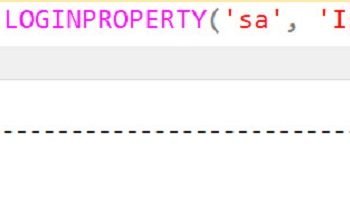Cannot resolve collation conflict for equal to operation.

In MS SQL SERVER, the collation can be set at the column level. When compared to 2 different collation columns in the query, this error comes up.
SELECT ID FROM ItemsTable INNER JOIN AccountsTable WHERE ItemsTable.Collation1Col = AccountsTable.Collation2Col
If columns ItemsTable.Collation1Col and AccountsTable.Collation2Col have different collation, it will generate the error “Cannot resolve collation conflict for equal to operation“.
To resolve the collation conflict add the following keywords around “=” operator.
SELECT ID FROM ItemsTable INNER JOIN AccountsTable WHERE ItemsTable.Collation1Col COLLATE DATABASE_DEFAULT = AccountsTable.Collation2Col COLLATE DATABASE_DEFAULT
Watch this quick video for resolution:
Collation can affect the following areas:
- Where clauses
- Join predicates
- Functions
- Databases (e.g. TempDB may be in a different collation database_default than the other databases some times)
Checkout following video how collation can change the order of the column:
Just like collation, there is another problem with SQL Server and that is related to Parameter Sniffing, I have written a detailed blog post about how the parameter sniffing can be resolved in SQL Server.
Here are some really good blog posts which you can read about parameter sniffing and how you can avoid the problem related to it.
- SQL SERVER – Parameter Sniffing Simplest Example
In this blog post, we discuss what actually is parameter sniffing and how we can overcome it with the help of recompiling the stored procedure. - SQL SERVER – Parameter Sniffing and Local Variable in SP
It is easy to overcome the parameter sniffing for the stored procedure by declaring the local variable inside the stored procedure. - SQL SERVER – Parameter Sniffing and OPTIMIZE FOR UNKNOWN
You can take advantage of the new query hint of Optimize For Unknown to simulate the local variable in the stored procedure. A very underutilized technique indeed. - SQL SERVER – DATABASE SCOPED CONFIGURATION – PARAMETER SNIFFING
This new database level enhancement was introduced recently which can help you overcome any issue with the parameter sniffing. - SQL SERVER – Parameter Sniffing and OPTION (RECOMPILE)
The oldest and most traditional technique to not cache the query plans and compile your stored procedure or queries every single time to get optimal performance. - Performance and Recompiling Query – Summary
This post summarizes the entire series of parameter sniffing, performance and recompiling query.
Reference: Pinal Dave (https://blog.sqlauthority.com)






381 Comments. Leave new
Let me thank you in 2009.02.09
Great Solution.
Hi…. thank u so much …it’s really work for me :-)
Genius!
Thanks a lot!!!!
Helped me too when I was doing an update query.
I didn’t even know what collation was before this!
I get this error, when I add the clause, Expression type numeric is invalid for COLLATE clause.
I have added as :
ON tablename.Columnname COLLATE DATABASE_DEFAULT = tablename.columnname COLLATE DATABASE_DEFAULT
Worked for me. Simple solution.
thanks,
Murthi
Thanks,Simple Solution.
But how can i make the two tables to have same collation?
I don’t want to have different collation for tables.
How can i know a table/column’s collation?
God bless you. your solution is really good.
Thanks a lot.
thanks!
worked like a charm!
Its simply great. Thanks.
Thank you. Your solution saved me from hour of work.
Thanks! You saved my life!
Awesome… quick easy answer, saved us some time this morning! Thanks
Hey, we have one ready applicaion…it’s working fine in most of the customer but only one customer getting this error.
[Microsoft][SQLServer 2000 Driver for JDBC][SQLServer]Cannot resolve collation conflict for equal to operation.
How to resolve this error with out chnage in code?
how to resolve this issue using SQL SERVER enterprise manager?
Regards / Sandeep
You saved my day. Thank!
Thanks a lot.
I had this problem and with this solution my query working fine.
A litlle diference between collates from diferent databases make this error.
Theres a one thing that I have doubt.
In my case I have 2 dbo’s
The firts have this COLLATE
SQL_Latin1_General_CP1_CI_AS
The other have this
Latin1_General_CI_AS
Whats the diference?
And theres a way to choose the right COLLATE in my query?
Sorry my english, I am brazilian…
Thanks again
I have collation error -‘Cannot resolve collation conflict for equal to operation’ when calling a function that returns a table. The function is as below:
CREATE FUNCTION [dbo].[Split]
(
@RowData nvarchar(2000),
@SplitOn nvarchar(5)
)
RETURNS @RtnValue table
(
Id int identity(1,1),
Data NVARCHAR(10) NULL
)
AS
BEGIN
Declare @Cnt int
Set @Cnt = 1
While (Charindex(@SplitOn,@RowData)>0)
Begin
Insert Into @RtnValue (data)
Select
Data = ltrim(rtrim(Substring(@RowData,1,Charindex(@SplitOn,@RowData)-1)))
Set @RowData = Substring(@RowData,Charindex(@SplitOn,@RowData)+1,len(@RowData))
Set @Cnt = @Cnt + 1
End
Insert Into @RtnValue (data)
Select Data = ltrim(rtrim(@RowData))
Return
END
Then i added the server’s collation name as :
RETURNS @RtnValue table
(
Id int identity(1,1),
Data NVARCHAR(10) COLLATE SQL_Latin1_General_CP1_CI_AS NULL
)
Then it is working fine. But i would like to know how to make this dynamic so that everytime the server’s collation property changes, i need not change the function.
for the above problem, i tried using database_default but it threw the same error. Is there anything like server_default?
Thank you for the help.
Yeah